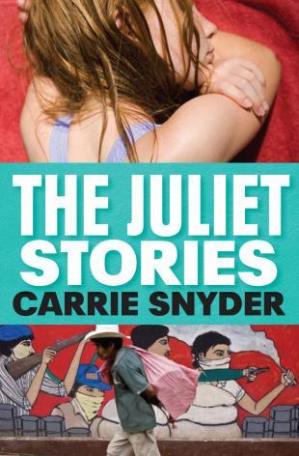The Juliet Stories
By Carrie Snyder
Published by House of Anansi, 324 pages, $22.95
Reviewed by: Jenny Boychuk
Let me tell you what you need to know.
This is the assertive voice that, while it doesn’t promise to spare heartbreak, guides readers with a controlled hand through Carrie Snyder’s novel-told-in-stories, The Juliet Stories.
It is 1984. Ten-year-old Juliet Friesen moves to Nicaragua with her two younger brothers and peace-activist parents—who have moved the family from their Indiana home in order to protest American involvement in the country’s post-Revolutionary war.
The novel is composed of two equal parts. In Part One: Amulets, the stories progress over the family’s time in Nicaragua to cover a year and a half. Juliet’s father is often away with his troops, and her mother is left to care for her family, which is in its own state of turmoil. The Friesens are free to be killed in this state of destruction, but also to live without the rules they’ve been accustomed to.
Juliet is a restless child who is preoccupied with trying to understand the world, and her view is anything but isolated. She writes letters to Ronald Reagan and change settles easily with her. She asks questions and is not satisfied with definitions—she needs to know how humans connect. She senses her mother’s increasing distance and vulnerability, how the two are at war within a woman who is supposed to, above all else, make her feel safe. While Juliet doesn’t believe anything could harm her family, she is acutely aware of the endings of things (an eerie foreshadowing): “Imagine that someday everything in the suitcase will no longer exist.” Juliet slips through the home unnoticed as she sees and hears things a child shouldn’t. She asks adult questions but cannot come to adult conclusions; she is “a whole person who is only incidentally a child.”
“The children are watching, the fields are on fire, the animals are screaming from a shed where they have been shut up and set alight, and the bayonet digs into the mother’s belly and pulls out a baby. Tossed to the dogs. The children are watching.”
Part Two: Disruption begins when the family moves back to Canada because one of Juliet’s brothers is ill. It would seem there is no longer any need to fight for peace in this country that is already so “free.” But Juliet does not feel the same freedom she felt in Nicaragua. The Friesens stop fighting for each other and, as Juliet ages, the family falls further apart—one heartbreak at a time.
The stories often feel more like chapters, especially in Part One. The point of view and voice are consistent, the transitions are smooth and one story clearly sets up the next. Part Two covers a much larger span of time and more chaos. The point of view deviates, it seems, when the family is most vulnerable. While this is a bit jarring at times, the form matches the content of the stories wonderfully.
Snyder’s prose is sharp and controlled—simply poetic.
Reading this book was like watching a family after the dinner party is over, after the forced smiles are gone and no is pretending that everything is OK. This honesty is what it means to fill human bones with flesh and blood. It moves far beyond what is black and white and into the deep grey areas of life and of living.
The first sentence of the book is this: “Somewhere between Texas and Managua, their bags go missing.” This is how I felt after finishing the book: you know that things went terribly wrong, but can’t pinpoint where. The first half of the book is necessary for the second to exist, though it seems as though they never touch each other, tied to invisible threads. You can’t quite remember everywhere you’ve been, but you know you’ve experienced something profound. The book is remarkably human in this way. It is a story about humans as they stand next to each other—what they need to take from each other in order to survive.
Read the epigraph after you finish the book. It will shake you.
Jenny Boychuk is a recent graduate of UVIC’s Department of Writing now living in Vancouver.
